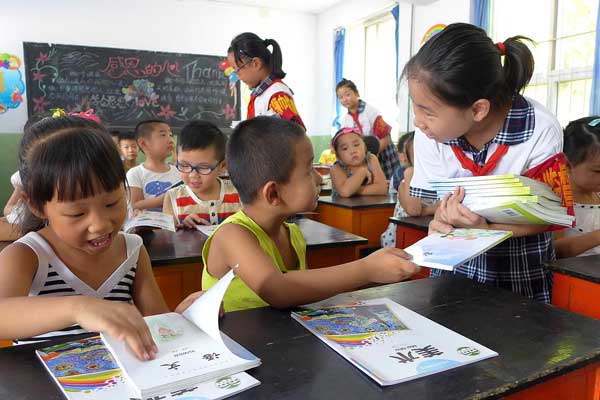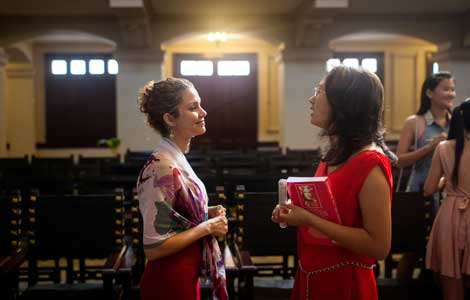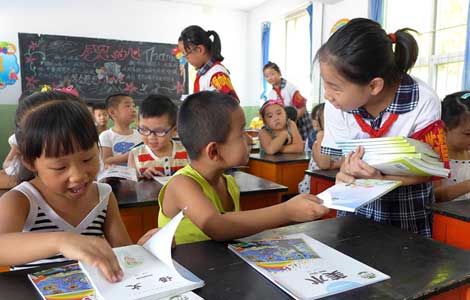Draft moots cut in homework
Updated: 2013-08-23 01:32
By Sun Xiaochen (China Daily)
|
||||||||
Guidelines on education aim to reduce academic pressure on young
Many students dream of having no more homework, and it seems that for some this dream may come true.
A draft guidelines document released by the Ministry of Education suggests homework may become a thing of the past for younger students. However, this and other suggestions on alleviating academic burdens have stirred up a debate among experts and teachers.
According to the document, which was posted online on Thursday for public comment, primary schools in China are required to not give any form of written homework to students from grade one to six.
Instead, schools should work with parents to organize extracurricular activities, including museum tours and library study, as after-school assignments.
Another part of the draft called on schools to reduce the number of mandatory exams, saying teachers shouldn't conduct any kind of unified tests for students from first to third grades.
Xu Mei, a spokeswoman for the Ministry of Education, said the draft was drawn up to urge primary schools to ease the excessive academic pressure that has started to affect younger students' healthy development.
However, experts said it would be unrealistic to fully implement the guidelines unless the entire education environment is dramatically improved.
"If homework or academic assignments are stopped, schools and parents will worry about the possible decline in enrollment rates, which remains the main assessment of education quality," said Wang Ming, director of the Elementary Education Department of the National Education Development Research Center.
"If we want to have a real impact on easing the burden, the assessment and enrollment systems, which still heavily count on examination results, should be adjusted."
The idea of relieving academic pressure on students has been discussed for years, but there are still cases of physical education classes being replaced by exams and extra tutoring.
The pressure has even extended to some kindergartens, where children are taught math and how to write Chinese characters, said Li Yan, president of Jinse Yangguang Kindergarten in Shenyang, Liaoning province.
Li said 60 percent of her kindergarten classes offer courses such as math and English, and only 40 percent of the time is spent on play activities.
Fitness time cut
Too many extra assignments and tutorials have also hampered students' physical development as children have little time left over for outdoor fitness activities.
Xing Wenhua, a professor at Beijing Sport University who has participated in the national physical survey for years, said Chinese students' fitness levels have been dropping since 1995, partially due to too much schoolwork.
"Part of reason for students' heavy burden comes from their parents," said Ren Yang, vice-president of Beijing Xicheng District Education Commission. "Parents tend to develop their children's potential in math, English and other specialties at a very young age. When students finish school, they will have other courses waiting. The key is to increase society's awareness, and not just cancel exams or homework."
Easing academic pressure could benefit children's health and give them more time to play, but some parents said homework is necessary.
Lu Qian, mother of third-grader Liu Hao, said written homework is necessary for her son.
"If he has no homework to do, how could he review the knowledge learned at school and how could he handle the pressure when he enters middle school and high school?"
Primary school teachers echoed Lu's comments.
"Burdens can be eased at primary schools but they will be added immediately at high schools with the college entrance examination looming," said Meng Wei, a teacher at Beijing Lei Feng Primary School.
"Students won't get used to it if they have no assignments at a young age. The original intention of the draft is positive, but the no-homework part is harder to accept."
Zhu Yonghong, a teacher at the Primary School Affiliated to Rugao Normal University in Jiangsu province, said the cancellation of exams at lower grades is also unacceptable.
"Tests are still the only effective way to examine a student's academic level ... It also works well as a motivator for them."
Other provisions of the draft regulation also include an end to junior high school enrollment exams and a ban on grouping students according to exam scores.
The draft regulation will continue to gather public opinion through Aug 29.
Most Viewed
Editor's Picks

|

|

|

|

|

|
Today's Top News
Bo Xilai denies bribery charges against him
US senator's comments draw fire
Chinese scientists asked to improve toilet
Experts say police need guns on patrol
Nasdaq resumes stock trading
German mitten crabs not 'qualified for import'
Chinese netizens debate upping retirement age
Egypt's Mubarak leaves prison
US Weekly

|

|

















